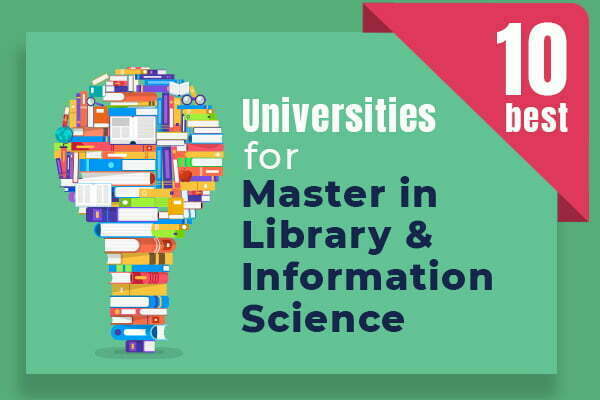Table of Contents
- Masters of Library and Information Science course structure
- Cost of studying Masters of Library and Information Science
- Eligibility criteria for Masters of Library & Information Science
- Top universities for Masters of Library and Information Science
- Which industries require Library and Information Science professionals?
- Job opportunities for Masters of Library and Information Science graduates
- Skills required
- How can I get jobs with this degree?
- What’s next?
Haven’t we all heard at least once that the need for a librarian is long gone? Well, this statement is deeply exaggerated. That’s because librarians aren’t solely engaged in handling hard copies. They have expanded on information with the help of technical tools and software. They’re also very well versed with the systems available within the library. So if you’ve always wanted to work in a place full of books, don’t fear! A Masters of Library and Information Science degree can make your dream come true!
Librarians not only possess skills like communication, organization, and management. They are also well versed in handling e-books, mobile applications, circulation management systems, etc. And now, with technology progressing, librarians are looking to understand maker space technologies, such as 3D printing, AR, VR, and more.

The various specializations recently developed in this field include archives and record management, digital libraries, rare manuscripts, and also school libraries.
Now that we know what you can possibly do with a Masters of Library and Information Science degree, let’s learn more about what it will teach you-
Masters of Library and Information Science course structure
A Masters of Library and Information Science program is a 1-year postgraduate degree that focuses on advanced library and information science theories.
- Since this course in interdisciplinary, it covers a lot more than just the limited library-related activities. It also lays emphasis on aspects of information.
- While you will learn how to manage a library, your subjects will merge with technologies that you can use to improve your management skills.
- Consequently, the course prepares you for the challenges of the coming years while also helping you enhance your skills in information accessing and storage techniques.
The subjects covered in this program include-
- Basics of computer and its applications
- Planning and management
- Statistical techniques
- Library management
- Research methodology
- Technical processing
- Digital libraries
- Library classification
- Computer applications to libraries
- ICT in Library
Cost of studying Masters of Library and Information Science
The exact cost of doing a Masters in Library and Information Science varies depending on the university and all that it offers. But to give you a rough idea-
- The average fee structure for this program is $45,000 to $55,000 per annum.
- However, please note that you can also pursue this courses through distance learning programs. This will allow you to study at your own pace and cost you less.
Additionally, you can opt for certificate and diploma courses in this field to enhance your knowledge. This gives you leverage to improve your skillset while also keeping up with the currently changing pace of technology.
Eligibility criteria for Masters of Library & Information Science
The eligibility criteria for this course include-
- Graduation degree from any relevant stream from a recognized university.
- A graduate with a minimum of 50%-60% aggregate from a recognized board.
- You have to be within the age bracket of 20-22.
- Those with a Bachelor’s in Library and Information Science or a Bachelor’s in Library Science will be given more preference.
Some institutes do offer direct admissions to students. But they also take interviews, conduct entrance exams, and hold group discussions as a part of the applicant shortlisting process.
Some institutes might base the admission process on a merit basis as well. As they release the merit list, you can go ahead with the admission process.
Top universities for Masters of Library and Information Science
Listed below are some of the best and most popular universities around the globe for pursuing a Masters of Library and Information Science.
- The University of Illinois
- University of California
- The University of Washington
- University of North Carolina
- British Columbia University
- University of Alberta- North Campus
- University of Maryland
- Syracuse University
- University of Tennessee
- Florida State University
Which industries require Library and Information Science professionals?
Yes, digitization has blurred the lines of publishing physical books and self-publishing them online. A heavy load of content is being churned out every day, transforming how content and data are consumed.
But despite technology being the ‘all you need factor,‘ there is still a need for human intervention more than ever. This has added a lot of value to the jobs of Library and Information Science experts.
- This degree will help you bag a job in the public and private sectors.
- You can also work in your industry of interest as a research assistant for professors.
- Publishing firms, where you can help prepare catalogs and bibliographies, are also a great option.
- You can also join other fronts like web content designing, database development, knowledge management, online publishing, and reference tool development.
- The main employment options for you would be colleges, museums, schools, local libraries, courthouses, and many more!
While there are numerous industries that accommodate professionals from this field, it is important to be passionate about books and have a drive for continuous learning.
Why, you ask? Well, because the average salary for Library and Information Science experts is INR 1,50,000 per annum.
Job opportunities for Masters of Library and Information Science graduates
There is high scope for those who complete the Master’s of Library and Information Science. Some popular job profiles include-
Librarian
A librarian is essential to running, well, a library, as they take care of everything that goes on within it. They need to have the know-how of cataloging, selecting, and circulating of resources, maintaining library materials, etc.
Deputy librarian
Deputy librarians manage the secondary library team. They also coordinate with teachers to provide the right resources.
Academic librarian
An academic librarian manages and organizes library sources to meet the necessary requirements.
Teacher librarian
Teacher librarians are like caretakers. They provide instructional media for the school.
Assistant librarian
An assistant librarian helps out with all the tasks needed to organize and acquire materials for the library.
Electronic resources librarian
An electronic resources librarian manages the electronic sources such as e-books, videos, databases, etc. They also maintain and receive serials in print and electronic formats.
Your earnings will depend on factors like work environment, level of education, and work experience, and can range anywhere between $34,300 and $91,620 per year.
Skills required
As an MLIS student, you need to have some technical skills, including-
- Research. Incorporate new technologies into research, MARC formats, electronic resource licensing and management, data visualization.
- Outreach. Knowledge of apple and android devices, develop outline learning materials, understand current trends in technologies.
- Preservation. Understand all the digital file formats, knowledge of XML schemas, and also automated archival collection management systems.
- Social media. Knowledge of creating, managing, and collaborating information. Also have basic HTML knowledge.
How can I get jobs with this degree?
Given the volume of participants, job searches might require you to chuck conventional thinking and learn how to market your skills well-
- With enough training, you can maintain a competitive edge to add value compared to the sea of competitors.
- A little bit of market research can go a long way in helping you secure a good job.
- You can also choose your preferred domain and opt for job profiles, including an academic librarian, knowledge manager, researcher, records manager, technical writer, and many more.
What’s next?
The internet has revolutionized traditional library activities with advanced document acquisition, document delivery, and also technical processing. Hence, libraries are becoming versatile unified systems with easy access to resources and information sharing.
No wonder Masters of Library and Information Science is now becoming an upcoming field.
And if you want to be a part of that boom, feel free to reach out to us with your thoughts. You can also drop a comment below!
Until next time!






